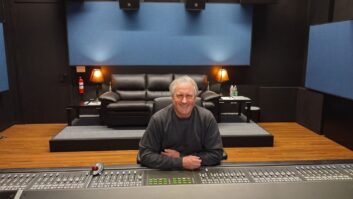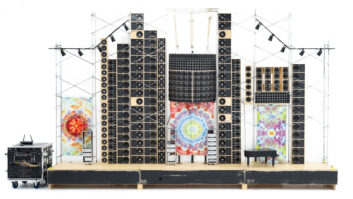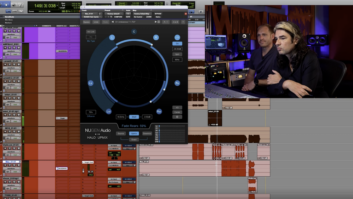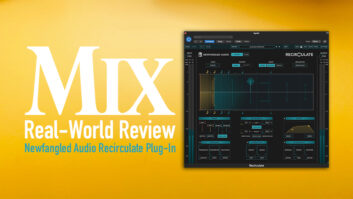September is back-to-school month. Mix‘s Education Issue runs in November (go figure). But for some of us, like those who teach audio and music technology, education is a year-round occupation. As I write this column during mid-summer, I don’t have to worry about this week’s class schedule, but my mind is very much on my students’ lab. At the moment, I’m replacing all of the first-generation Power Macs in the lab with new G4s and all of the fixin’s that go with them — new audio and MIDI interfaces, new screens and software — because a lot of the old stuff I’ve been using won’t work on these machines, even under OS 9. You know what a hassle it is to replace your computer, throw out everything on it and start again from scratch. Well, that’s what I’m doing, times 10. (And I’m also rebuilding my home studio so that I can keep up with my students!)
With this going on, naturally I’m thinking about the courses I’m going to teach in the fall and the courses I’d like to teach someday. Not to mention the courses I’ve taught in the past, and what I have learned from them, because in the world of education, it is often said that the best way to learn a subject is to teach it.
Audio education is really, really hot. Once upon a time, it was possible to walk into a recording studio knowing next to nothing and absorb everything you need to by watching and listening and helping. But today, if you don’t have a solid background in things like signal flow, A/D conversion, signal processing, synchronization and computer operating systems, you won’t last long enough to collect your first paycheck.
It’s no surprise that about once a week, I get an e-mail from someone who wants me to help them choose an audio school or program. They want to know who’s got the best gear, who’s got the latest computer stuff and who’s got the best placement rate for graduates. They figure, and rightly so, that a solid education in audio’s principles and techniques will give them a leg up on the competition, help them get jobs or set up the businesses that they want. Yet surprisingly, few of them are asking the really important questions.
After 15 years in this business, I hope that I’ve learned something about the kinds of schools and programs that help students succeed and which don’t. So in this back-to-school month, here are some of my thoughts on what potential students should be asking about, and looking for, in a school.
Look for a broad curriculum and plan to take advantage of it. Don’t decide ahead of time everything you expect to learn. Resist the temptation to take just courses you think you’ll enjoy, or be good at, and exclude everything else. Use the opportunity of being in school to broaden your horizons and to get exposure to areas you know nothing about.
You may come into a program thinking you want to produce Britney Spears’ next album and come out of it realizing that your true calling is installing surround systems in movie theaters. But, if the only courses your school offers (or the only ones you sign up for) are in record production and there are none in system design and installation, you’ll never find that out. I can’t tell you how many students of mine have ended up in places completely different from where they expected to be and love it.
Equipment is great, but it isn’t everything. The number of vintage Neves or computerized SSLs a school has may look impressive, but remember, only a certain number of students can work on them at a time. Besides, the difference between the real high-end stuff and today’s “mid-level” recording and mixing equipment isn’t as significant as it used to be; a Yamaha 02R is not an expensive piece of gear, but learning on one will give you an understanding of how all consoles work so that if you some day encounter an SSL, it won’t intimidate you. (And besides, in the real world, you’re far more likely to end up using something like an 02R than an SSL.)
Does a school have to offer a particular piece of gear? Not really, although it’s a safe bet that any school worth considering will have ADATs, Pro Tools setups and some digital consoles. But in 10 years, no one will be using ADATs, and someone else entirely might be ruling the world of DAWs. What’s important is to learn the principles behind all of these devices. Once you do that, you can apply them to any other gear that does the same job: DA-88s and MX-2424s, SADiEs and Fairlights, Mackie D8Bs or anything else that comes down the pike.
Of more concern should be how many studios or workstations are available to students and how much time each student gets on them. Are there good spaces to record live instruments? Are there good musicians who are available to record? And are there enough microphones to go around, even if they’re not all Neumanns?
Don’t cop an attitude. You’re there to learn, not to show off. Just because you’ve been doing remixes at home on your laptop since the sixth grade doesn’t mean that you know everything about audio, and it will do you no good to come into a program thinking that way. Although what you can do today on a single computer is astounding compared to even three years ago, there is a lot more to the art and science of audio.
It’s difficult to understand how a compressor works until you’ve actually plugged a live microphone into one and listened to how the sound changes as you adjust the controls. You can learn to use audio tools by trial and error (and that’s sometimes a good way to achieve creative leaps), but in the professional world, there isn’t much time for that. If you know what a compressor is supposed to do and how to turn it into a limiter, an expander and a gate, then that dynamics plug-in on your computer will make a heck of a lot more sense.
Learn the language of music. You see those folks on the other side of the glass, the ones with the funny-looking wood and metal things in their hands? Those are musicians. They’re usually very well-trained and they communicate in a language — verbal and nonverbal — all their own. They talk about beats, bars, keys, verses, bridges, tempo and codas. They grunt, wave their hands, twirl their fingers in the air and point to their foreheads. If you don’t know what all of these things mean and how you should respond to them, you’re not going to be of much use to them. And they’re not going to be particularly interested in working with you again. The more kinds of music you know — classical, jazz, ethnic and folk, along with rock and rap — the more useful you will be in the studio and the more fun you’ll have.
What’s the best way to learn music? That’s easy: Take lessons on an instrument and play in ensembles. And by instrument, I don’t mean a turntable, and by ensembles, I don’t mean three bellowing guys in sweatshirts walking back and forth on a stage with a drum machine on the floor. It doesn’t matter which instrument you learn — guitar, piano, tuba or xylophone — as long as there are notes and a way to write them down. You can play in a brass quintet, a concert band, a Led Zep-style power trio or a string ensemble. All of these experiences will help you understand the way musicians interact, which is knowledge that you can take to your side of the glass. And don’t forget voice lessons, not necessarily so you can sing, but so you can work with singers. Knowing something about vocal production, projection, breath and intonation is a great advantage when it comes to coaxing the best out of a singer.
Listen, listen, listen. Critical listening is probably the most important discipline an audio program can offer. Being able to tell the difference between echoes and reverb, between +3 dB at 1 kHz and +6 at 5 kHz, between preamp overload and speaker distortion, between an oboe and a clarinet, and between a guitar in tune and one that’s not, is one of the best skills that you can offer a future employer.
The school should offer a critical-listening course that has a good instructor, carefully chosen materials, and a neutral, balanced listening environment. There are some good ear-training packages that you can buy to use at home, but nothing beats the feedback that you get in a classroom from the teacher and other students.
And speaking of which, it seems that a lot of people are interested in taking audio engineering courses on the Internet. Because you can get everything else online, from “herbal mixtures” to “NUDE pics of Britney!!,” it seems that such a thing is possible. In fact, considering the number of scam artists on the Web, I’d be surprised if something like this didn’t exist. I personally haven’t investigated any online programs, because I think the whole idea of non-contact audio education is silly and about as useful as taking piano lessons by mail order. (Not so long ago, people tried that, too — I’ve got the matchbook covers to prove it!)
Think about it: How can you possibly afford to try out dozens of different microphone, speaker and processor combinations at home? How can you set up a perfect listening environment all by yourself? How can you play all of the instruments in a band at the same time so that you can learn how to deal with the leakage? And how can you get “remote” feedback on something you’ve done before you’ve forgotten how you did it?
A knowledgeable instructor who will provide an immediate hands-on response to what you’ve done, who will show you what you did wrong and who will put your fingers on the magic button to make it right is an incredibly important factor when you’re learning about audio. Equally important is the exchange of ideas and perspectives that you get from your fellow students. When you graduate and go out into the real world, you’ll find the personal contacts you’ve made in school, among both faculty and students, to be invaluable when you are looking for a job or a collaborator.
Learn to work with other people. Despite the enormous growth of the home-alone studio, most audio projects are still group undertakings. Whether it’s concert sound, theme park installation, recording a band or designing a new product, teamwork is an essential part of the real world of audio. A school is a great place to learn how to get things done cooperatively. It’s low-risk: If you screw up a session, no one from the record company is going to threaten to sue you for the money you’ve just lost them. And it’s also a good place to get a wide variety of team experiences as a leader and as a follower, as well as to find out what your strong and weak points are while working with others.
Find out about the faculty. Do they have real-world experience or are they mainly academic types? You probably don’t want to be in a program that is taught entirely by academics. While they may well have a lot to offer audio students — especially in subjects like physics, electronics, acoustics, music theory and musicology — today’s audio scene is primarily commercially oriented, and it changes very fast, something that the academic community doesn’t do. Ideally, a program will offer a mix of professional teachers and teaching professionals, meaning men and women who’ve worked extensively as engineers, producers, designers or even session players, and who are good at imparting wisdom to the next generation.
At the same time, beware of schools and instructors without academic credentials. Are the teachers there because they really love to teach or because it’s something to do in between gigs? Or do they teach because they can’t get any gigs? Sad to say, some places will hire “teachers” based on the fact that they can talk the talk, and little more, and that they don’t ask for a lot of money. Uninspiring at best, these folks can be deadly.
Talk to graduates. People who have gone through the program are your best source of information about how useful it is. First of all, if the school can’t put you in touch with at least a half-dozen of them, then walk away. But if they do give you a list of alumni, then track these folks down and see what they’re doing and how the school helped them get there. If you’re dying to learn how to mix live shows and all of the alumni you talk to seem to be testing workstation software, maybe their school isn’t the right one for you. Besides being fonts of knowledge, faculty should be able to assist students with contacts for internships and jobs. Graduates of the program will tell you if the faculty was able to give them the time and information they needed to help them on their chosen path or if the teachers just vanished after the bell rang.
Take business courses. Absolutely the worst time to learn about the roles of the manager, the agent, the producer and the record company is when you are about to sign your first production or recording contract. You will be so eager, and so flattered, that someone wants to give you money for your work that you’ll be happy to sign anything they put in front of you. But a contract may have clauses in it that are unfair, inappropriate or downright larcenous. You need to be able to ferret out those clauses, object to them and get them removed. If you’re not under time pressure (which you will be), you can ask a lawyer to help you, but that may get expensive. If it takes a long time for the lawyers to kick it back and forth (which it will), you’ll get more and more anxious that the company will lose interest in you — and it might.
If you have a good grounding in music-business practices before you get into that situation, you can avoid a lot of headaches. Every student today should take a course in copyright law and how it’s being redefined by the media conglomerates, the all-music-should-be-free crowd and everyone in between. Knowing how the legal issues surrounding music are evolving is almost as important as understanding where technology is headed. If you know both, you will be way ahead of the game.
Paul Lehrman, Mix‘s “Insider Audio” columnist and Web editor, teaches in the Multimedia Arts program at Tufts University, where the sports teams are named after a stuffed elephant.







